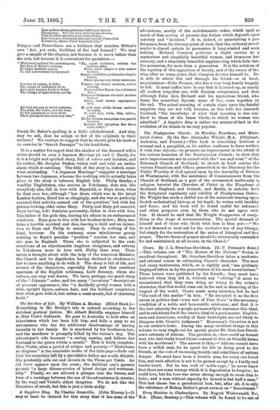Latin and Greek Verse Translations. By W. Baker, D.D. (Long-
mans.)--Dr, Baker is the chief of one of the most successful of our great classical schools. He lets us here into one of the secrets of his art, for he shows us that when he has set his head-form an exercise in verse, Greek or Latin, he can himself produce an excellent " fair copy." Here in this volume we have a hundred of these "copies," of which about two-thirds are Latin (mostly elegiacs). We could wish that Dr. Baker had given us nacre specimens of the Greek hexameter, surely the most magnificent of all metres. He has no reason to be ashamed of the one that he has published, a translation from "Hiawatha," beginning "And the ancient arrow-maker." Here is a specimen of hexameter :— "Sic deinde Conjugis a dextra dextram Ind:trash, et altos Be Wit in Ineos, Dryadis Tel Oreadis instar Vel ante Detlacam comitatur nymphs Dianam,
Ipsa quidem divans gressuque habituque decor° Exsnperans. Non ilia area pharetraque decora, Villa falciferi manibus gerit arena Priapi, Quin fern guns hominum donisque insueta Promethei Extuderat, melon Pater demiserat alto."
Priapus and Prometheus are a boldness that matches Milton's own "Art, yet rude, Guiltless of fire had formed." We may give a sample of the elegiacs, not because it is much better than the rest, but because it is convenient for quotation:— "With head reclined the snowdrop see, "En, raput inolinans, wholes tna
The first of Flora's progeny, maxima math, In virgin modesty appear Flora, mkt campis a nave nomen To hail and welcome in the year I batens ; Simples munditiiv, padibundre virginis instar, Oinine quo nascens Isetior mums eat.
Fearless of winter, it defies Frigora non hiemis metnens, =live The rigour of inclement skies, roinam, And early hastens forth to bring Pro vocat horn Norm vim, rabiemque The tidings of approaching spring. Ncti ; Primaque festinans abenntis prodere brunas Cigna, milt Items approperare dies.
All that the gay or sweet compose, fii quid ined nitido forum melioris The pink, the violet, and the rose, in borto,
In fair succession as they blow, Si quid oast, violin, lilis, caltha,
Their glories to the snowdrop owe." rase ; tit din quisque sues grata vice pandit honoree,
Quisque tibi aceeptum Cos deem ensue ref ert."
Surely Dr. Baker's spelling is a little old-fashioned. And why, may we ask, does he assign so few of the originals to their authors ? We venture to suggest that he should give his book as an exercise in "Search Passages" to his head-form.



































 Previous page
Previous page